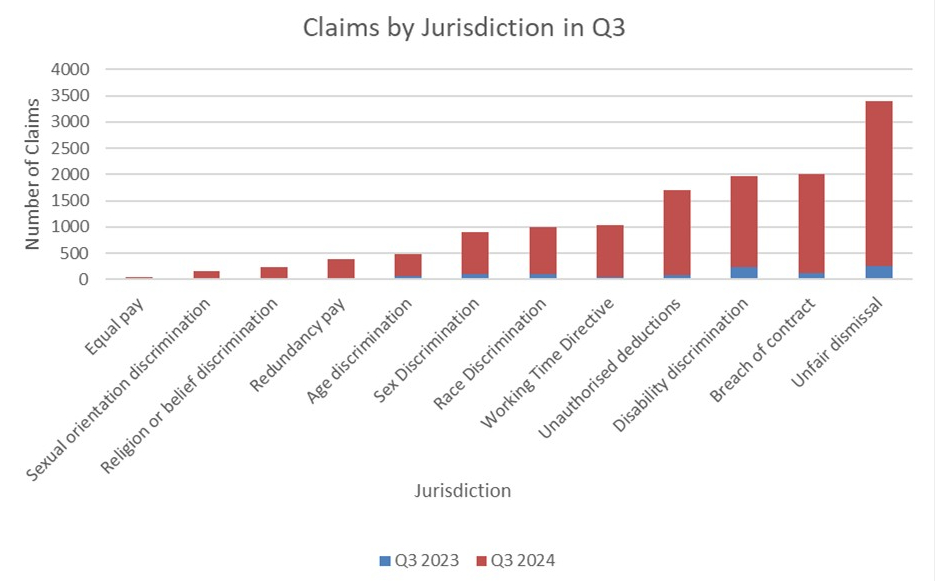
The number of claims brought to the employment tribunal are rising year on year. The Ministry of Justice have published employment tribunal quarterly statistics for Q3 2024/25, with data now available up to December 2024, revealing that there were over 420,000 open claims at the start of 2025. In comparison with Q3 2023/24, the tribunal received 36% more single claims (brought by one person) and disposed of 35% more. Multiple claims, which are claims brought by more than one person, decreased when compared to Q3 2023/24 (down 6%) and there was a large decline in the number of disposals in multiple clams with just 4,300 disposals, down from 33,000 in Q3 of the previous year.
The total number of claims in the tribunal span a number of jurisdictions and claims are rising across every jurisdiction, but discrimination claims form a significant portion. Disability discrimination remains the most prevalent claim (along with unfair dismissal and breach of contract). ACAS advises that a large number of disability discrimination claims are driven forward to the hearing stage rather than being resolved internally or by early conciliation due to the short and strict time limits for bringing a claim, but upcoming changes to employment law could spur further drastic increases in the number of claims.

The Employment Rights Bill is set to heighten protections around unfair dismissal and increase the pool of workers eligible for employment rights. Currently, an employee needs two years’ continuous service to bring a claim for unfair dismissal, but the Bill (if passed in its current form) intends to make it a day-one right. The Bill also broadens the definition of ‘employee’ for the purposes of employment rights, meaning that more workers will be able to access protections and will be eligible to bring claims of unfair dismissal in the tribunal. The Employment Rights Bill also lengthens the time limits for bringing a claim to the tribunal to six months, giving workers three extra months to obtain advice and bring a claim.
Businesses are facing more economic pressure than ever and are constantly reacting to changes in law and policy. With the other increases in employment costs such as employers’ national insurance contributions, business owners are under more pressure to make ends meet by cutting costs, managing staffing levels, and freezing pay increases. This will inevitably lead to more dismissals. While the changes to law and policy are set to provide greater protection to workers, it is undeniable that the already stretched-thin tribunal system will be under even more pressure moving forward.
It is clear that claims are already on the rise across all jurisdictions. Recent and upcoming changes to employment law have widened the scope for claims. Businesses can take proactive steps to prepare for the changes to the law. While there is no way to completely avoid claims being brought against your business, it is possible to mitigate the risk by ensuring that both the employer and employee know what to expect of each other.
- Have well drafted, robust employment contracts. An employee and employer should know what to expect from each other in the working relationship. It is crucial for preventing misunderstandings and managing both employees’ and employers’ rights and obligations. Maintain accurate records of contracts, wages, and benefits to demonstrate compliance.
- Implement, follow, mandate, and update workplace policies on issues such as harassment, discrimination, grievances and disciplinaries. Foster a positive working culture in which employees feel able to speak up about issues at work.
- Provide training to managers on the key elements of employment law. Poor management is a leading issue in tribunal claims. Training can be tailor made to your organisation to ensure managers have a good understanding of their obligations whilst being conscious of when it might benefit the business to take specialist advice.
- Address issues promptly. Any complaint raised whether formally or informally should be taken seriously and addressed early, fairly, and consistently. ACAS reports that the grievance procedure taking a long time and the relationship between the employee and the employer breaking down can impact a dispute not being resolved before the tribunal stage.
- Manage grievances, disciplinaries, and dismissals correctly. Ensure any misconduct is investigated thoroughly and properly documented. Follow the proper procedures for discipline and dismissal. Discipline proportionately – misconduct warranting dismissal can often be a high bar and improper and unfair dismissals are the leading employment tribunal claim.
- Take legal advice. Our specialist employment lawyers are on hand to assist with contracts, policies and handbooks, training for managers and staff, advice about how to manage grievances, help navigate new regulations as the legal implications unfold and provide representation at tribunal.
For further advice on Employment Triunals or any other employment law issues please contact the Thorntons Employment Law team on 03330 430350.


